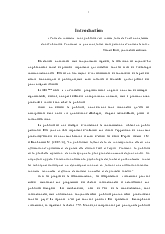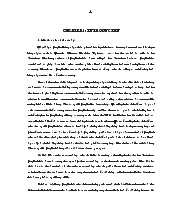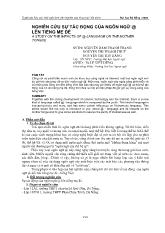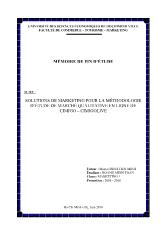AFFECTIVE FACTORS AFFECTING STUDENT PARTICIPATION IN THE CLASSROOM SPEAKING ACTIVITIES: A CASE STUDY OF THE FIRST YEAR STUDENTS OF ENGLISH AT TAY BAC UNIVERSITY
- Người chia sẻ : vtlong
- Số trang : 41 trang
- Lượt xem : 11
- Lượt tải : 500
Các file đính kèm theo tài liệu này
 Luan%20van%20.doc
Luan%20van%20.doc
- Tất cả luận văn được sưu tầm từ nhiều nguồn, chúng tôi không chịu trách nhiệm bản quyền nếu bạn sử dụng vào mục đích thương mại
Bạn đang xem trước 20 trang tài liệu AFFECTIVE FACTORS AFFECTING STUDENT PARTICIPATION IN THE CLASSROOM SPEAKING ACTIVITIES: A CASE STUDY OF THE FIRST YEAR STUDENTS OF ENGLISH AT TAY BAC UNIVERSITY, để xem tài liệu hoàn chỉnh bạn click vào nút DOWNLOAD LUẬN VĂN ở trên
The Department of English – Tay Bac University operates within the curriculum framework of the Ministry of Education and Training. However, the fact shows that there has not been a specific curriculum for English Departments, which makes it difficult for the teachers to design their own syllabus based on general objectives of the Ministry of Education and Training. After the course the students have to be able to communicate successfully in social situations such as talking about life or career. They have to take part in discussion, negotiation or explanation of social issues, agree or disagree with others’ opinions, . They have to gain confidence in communicating successfully, using communicative strategies to express their ideas, and feelings appropriately and fluently. However, there is a fact that the students do not gain these objectives.
In order to achieve these objectives, the teachers have to invest a lot of time, energy, passion, intelligence and creativity into designing suitable lessons as well as finding out how to teach speaking skill to help the students achieve the above objectives. Therefore, the teacher should begin analyzing students’ needs, and interests in learning English during the process of designing lesson activities.
After several years of teaching speaking skills, we have found that the first year students are still quite passive in speaking English. They do not actively participate in speaking activities. Students’ participation in classroom activities has been the centre of various TEFL research. In general, it can be affected by a variety of factors coming from teachers’ side like teacher’s teaching methods, teachers’ characteristics, teachers’ knowledge; students’ side such as motivation, attitudes, personality, learning styles, age, gender differences; and others including classroom environment, types and contents of activities, etc. All the factors, even they are subjective or objective, are composed of social, cognitive and affective features. These features are equally important for learners to learn an L2.
It can be seen from the fact of our teaching and learning that students’ learning is much affected by their feelings and emotion. When being asked if they like learning English or not one of the students who had poor participation in learning answered: “I don’t really like learning English. The reason why I’m here to study English is I have no other choice.” I was very surprised at what the student said. This also helped me understand why that student didn’t participate actively in the speaking activities. It can not be denied that the student’s feelings and attitudes toward learning English affect his learning process in general and his participation in learning activities in particular.
Research on second/foreign language acquisition has identified a variety of factors hypothesized to account for some of the variance in the level of proficiency attained by individuals learning a second language. The factors considered may generally be classified into two basic categories: cognitive and affective variables. Cognitive variables are the relatively stable ability characteristics of learners that may affect the success with which an individual learns another language. These are factors such as aptitude, intelligence, and certain cognitive style characteristics. Affective variables, on the other hand, describe individual characteristics relating to factors such as attitude and motivation.
In fact there are quite a lot of affective factors other than motivation and attitude, but in this study I limit the concept to four factors: attitude, motivation, anxiety, and personality. Although there have been many studies on affective factors conducted in various contexts, especially factors causing anxiety in second/foreign language learning, not a single one has ever been done on students in the mountainous areas. This study is an attempt to explore this issue in relation to speaking English.
In conclusion, the study is of great value in terms of both theoretical and practical aspects. From the theoretical angle, it provides us with the knowledge about the factors and affective factors affecting students’ participation in speaking activities, and also the study can be an implication for teachers who want to enhance learners’ participation in their learning.




